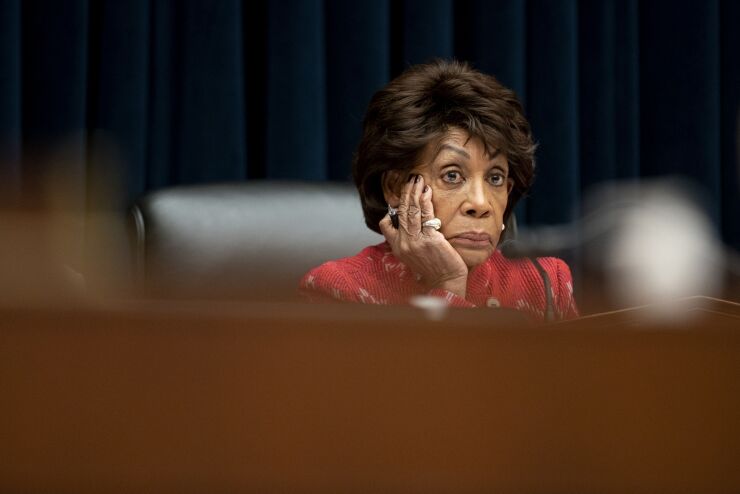WASHINGTON — House Financial Services Committee Chair Maxine Waters called on the head of the Federal Deposit Insurance Corp. to explain the legal reasoning used to disavow a vote by the Democratic majority on the agency's board of directors.
"I ask that you promptly cite the legal authority and provide any legal analysis that you are relying on in your attempt to unilaterally block the will of the majority of the FDIC Board to carry out the agency’s responsibilities," Waters wrote in a letter this week to FDIC Chair Jelena McWilliams, who was appointed by former President Donald Trump.
Waters sent the letter nearly two weeks after the struggle for control of the FDIC’s policy agenda came to light. On Dec. 9, Consumer Financial Protection Bureau Director Rohit Chopra and FDIC board member Martin Gruenberg announced a vote — without McWilliams's approval — to solicit public comment about bank merger reviews.
The FDIC has refused to acknowledge the vote. McWilliams has said it was not legally valid, claiming that only she can bring a board item up for consideration. But Chopra and Gruenberg cited agency bylaws that they said authorized them to vote notationally. (Acting Comptroller of the Currency Michael Hsu also voted in favor.)

“I am disappointed that you would seek to deny the public an opportunity to provide their feedback on ways the FDIC’s bank merger review procedures could be strengthened as envisioned by the Board,” Waters wrote in the letter dated Tuesday, echoing a statement she released after the board vote.
The FDIC did not respond to a request for comment.
McWilliams has invoked a
Waters’s letter requested that McWilliams “reconsider your position on this matter, and that you instead collaborate with your FDIC Board Members and other regulators to promote competition by improving FDIC’s outdated bank merger review process for the benefit of the public.”
Last week, Republicans defended McWilliams, introducing legislation to
Waters requested that McWilliams respond to her office’s inquiry no later than Jan. 21.
The letter asked the FDIC chief to cite the legal basis for ruling that a request by the other three board members to have their vote included in official FDIC board minutes was out of order. Waters also asked for information on what steps the FDIC has taken to enhance the agency's bank merger review framework pursuant to an executive order by President Biden.
Waters said Congress has rarely stipulated that the approval of the chair of a multimember board is needed for the board to act. For example, the chair of the Financial Stability Oversight Council (the Treasury secretary) "is required to vote in the affirmative for FSOC to designate a nonbank financial company for enhanced supervision if it poses a threat to U.S. financial stability," she wrote.
"However, there appears to be no similar stipulation requiring that the FDIC Chairman vote in the affirmative for a majority of the FDIC Board to act, nor does the statute give the FDIC Chairman the authority to veto an action taken by a majority of the FDIC Board.”
"Instead of accepting a similar action by your fellow Board members as legitimate, it appears you are taking unprecedented actions to prevent a majority of an independent regulatory agency to carry out its statutory duties," Waters wrote.





